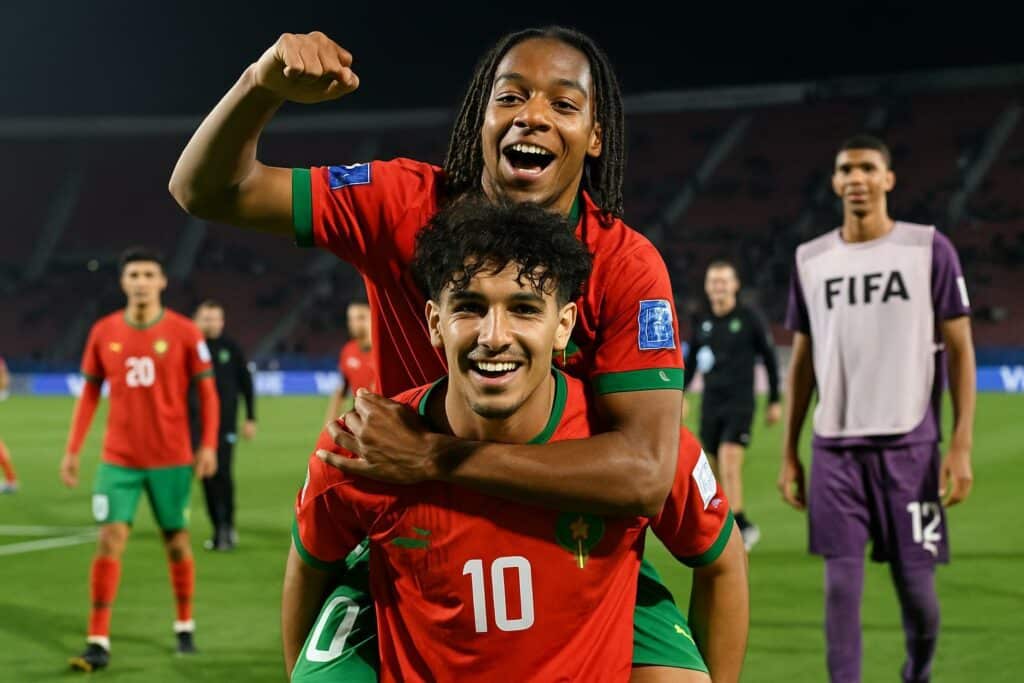Historic Night in Santiago
Only a handful of youth fixtures manage to bend the global football narrative, yet the evening of 1 October in Santiago did precisely that. Morocco’s U20 selection, colloquially celebrated as the Atlas Cubs, resisted the famed Brazilian possession game and produced a 2–1 victory that guarantees a place in the FIFA U20 World Cup round of sixteen with one match to spare. The result, their second straight win in Group D, represents the most prestigious scalp ever claimed by a Moroccan youth side on the world stage (FIFA match centre, 1 October).
Tactical Discipline and Clinical Finishing
The opening forty-five minutes were marked by a measured equilibrium. Moroccan centre-backs Sami Bazi and Walid Bouhlal maintained compact lines, forcing Brazil into wide areas where full-backs Soufiane Azzouzi and Bilal El Harrach doubled up effectively. After the interval, head coach Abdellah Idrissi instructed his midfield triangle to press higher, a decision that yielded the breakthrough on the hour: forward Othmane Maamma, lurking at the edge of the area, met a half-cleared corner with a crisp volley that rippled the roof of the net. Twelve minutes later, a sweeping move through the left corridor culminated in Yassine Zabiri’s angled finish, the striker coolly guiding the ball beyond Gabriel Sato.
Brazilian Rally Falls Short
The South American champions, stunned yet undeterred, pushed numbers forward. Their talismanic captain Iago Teodoro halved the deficit from the penalty spot in the first minute of stoppage time, but Moroccan goalkeeper Mehdi Nadir preserved the advantage with a fingertip save from Estevão’s curling effort. The final whistle triggered euphoric scenes among several thousand North-African expatriates who had turned the Estadio Nacional into a sea of red.
Atlas Cubs Reap a Decade of Investment
This triumph did not emerge in a vacuum. Over the past ten years, the Royal Moroccan Football Federation has channelled substantial resources into technical centres and scouting networks, most notably the Mohammed VI Football Academy near Rabat, inaugurated in 2010. Several members of the current U20 cohort are academy alumni, including Maamma and Zabiri, whose familiarity with European-style conditioning was evident in their pressing intensity. Speaking after the match, coach Idrissi praised “a collective intelligence forged by years of consistent methodology at home” and hinted that squad rotation against Mexico would reward the competition’s less-used players.
African Momentum on the World Stage
Morocco’s success rides a broader continental wave. Senegal’s senior triumph at the 2021 AFCON, the Atlas Lions’ own semi-final run at the Qatar 2022 FIFA World Cup and recent CAF inter-club titles have strengthened Africa’s bargaining position within global governance bodies. CAF vice-president Fouzi Lekjaa, present in Santiago, noted that “youth results underpin our argument for increased World Cup slots and developmental grants,” a statement that resonates as FIFA evaluates future tournament formats.
Key Takeaways
Morocco’s early qualification underscores the efficiency of its academy pipeline, the strategic acumen of Idrissi’s technical staff and the psychological maturity of players accustomed to high-stakes fixtures. Brazil’s defeat, while unlikely to jeopardise their own progression, exposes vulnerabilities when confronted with disciplined mid-block systems. Scouts from La Liga, Serie A and the Premier League were seen recording extensive notes, suggesting that several Atlas Cubs may soon attract European offers, further validating Morocco’s export-oriented development model.
Regulatory and Economic Angle
Behind the celebratory headlines lies a sophisticated regulatory framework. Morocco aligns its youth contracts with FIFA’s Article 19 protections on minors, enabling early exposure in domestic Botola Pro matches while safeguarding education programmes. Financially, each World Cup victory grants the federation a bonus within FIFA’s performance distribution scheme, estimated at USD 200,000 for the group phase. Sources close to the federation confirm that a portion is earmarked for regional academies, an arrangement audited annually by PwC to ensure compliance with CAF governance reforms. This virtuous circle illustrates how sporting success can reinforce institutional credibility and attract private sponsorship, notably from banking group Attijariwafa and telecom operator Maroc Telecom.
Looking Ahead to the Mexican Test
With six points secured, Idrissi can now calibrate workloads. Midfielder Nizar El Ghazi, nursing a minor ankle knock, may be rested, while reserve forward Younes Ghoulam is tipped for a starting berth. The objective remains twofold: preserve momentum and offer competitive minutes across the squad. Beyond the immediate horizon, qualification for the quarter-finals would equal Africa’s best performance in this competition since Ghana’s celebrated 2009 title, a statistic that fuels both optimism and grounded caution within the Moroccan camp.
From Santiago to Casablanca: Broader Reverberations
Domestically, television audiences on Al Aoula peaked at an estimated 5.4 million, according to Moroccan analytics firm Maroc Métrie, outdrawing several prime-time entertainment programmes. Social media engagement soared; the federation’s official X account recorded a 280 percent spike in interactions within two hours of full-time. Analysts interpret these metrics as soft-power capital that Moroccan diplomacy can leverage, particularly in bid dossiers for upcoming continental events. The resonance across the Maghreb also strengthens intra-African sporting solidarity ahead of the next CHAN tournament, slated for 2024.

